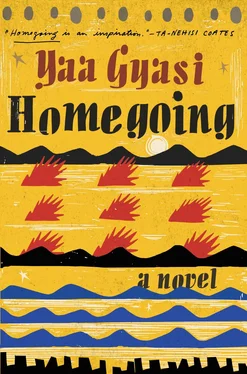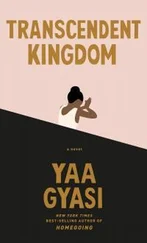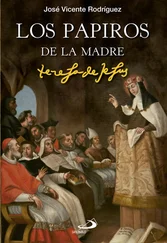“Are you white?” Cudjo had asked him, touching his hair.
Quey recoiled at Cudjo’s touch, though many others had done the same thing, asked him the same question. “I’m not white,” he said softly.
“What? Speak up!” Cudjo said, and so Quey had repeated himself, nearly shouting. From the distance, the boys’ fathers turned to observe the commotion.
“Not so loud, Quey,” James said.
Quey could feel color flood into his cheeks, but Cudjo had just looked on, clearly amused.
“So you’re not white. What are you?”
“I’m like you,” Quey said.
Cudjo held his hand out and demanded that Quey do the same, until they were standing arm to arm, skin touching skin. “Not like me,” Cudjo said.
Quey had wanted to cry, but that desire embarrassed him. He knew that he was one of the half-caste children of the Castle, and, like the other half-caste children, he could not fully claim either half of himself, neither his father’s whiteness nor his mother’s blackness. Neither England nor the Gold Coast.
Cudjo must have seen the tears fighting to escape Quey’s eyes.
“Come now,” he said, grabbing Quey’s hand. “My father says they keep big guns here. Show me where!”
Though he’d asked Quey to show him, Cudjo was the one who began to lead the way, running until the two boys had zipped past their fathers, toward the cannons.
—
It was in this way that Quey and Cudjo became friends. Two weeks after the day they first met, Quey had received a message from Cudjo asking if he would like to visit his village.
“Can I go?” Quey asked his mother, but Effia was already pushing him out the door, overjoyed at the prospect of a friend.
Cudjo’s was the first village that Quey had ever spent a lot of time in, and he was amazed at how different it was from the Castle and from Cape Coast. There was not even one white person there, no soldiers to say what one could or could not do. Though the children were no strangers to beatings, they were still rowdy, loud and free. Cudjo, who was eleven like Quey, was already the oldest of ten children, and he ordered his siblings about as though they were his tiny army.
“Go and fetch my friend something to eat!” he shouted at his youngest sister when he saw Quey approaching. The girl was but a toddler, thumb still inseparable from mouth, but she always did as Cudjo said as soon as he said it.
“Hey, Quey, look what I’ve found,” Cudjo said, hardly waiting for Quey to reach him before opening his palm.
Two small snails were in his hands, their tiny, slimy bodies wriggling between Cudjo’s fingers.
“This one is yours, and this one is mine,” Cudjo said, pointing them out. “Let’s race them!”
Cudjo closed his palm again and started to run. He was faster, and Quey had a hard time keeping up. When they got to a clearing in the forest, Cudjo got down on his stomach and motioned for Quey to do the same.
He gave Quey his snail, then marked a line in the dirt as the starting point. The two boys put their snails behind the line, then released them.
At first, neither snail moved.
“Are they stupid?” Cudjo asked, prodding his snail with his index finger. “You’re free, stupid snails. Go! Go!”
“Maybe they’re just shocked,” Quey said, and Cudjo looked at him like he was the one who was stupid.
But then Quey’s snail started to move past the line, followed, seconds later, by Cudjo’s snail. Quey’s snail didn’t move like a snail usually did, slowly and deliberately. It was as though he knew he was racing, as though he knew he was free. It didn’t take long for the boys to lose sight of him, while Cudjo’s snail ambled along, even turning in a circle several times.
Suddenly, Quey was nervous. Maybe Cudjo would be angry at his loss and tell him to leave the village and never come back. Quey had only just met Cudjo, but already he knew that he didn’t want to lose him. He did the only thing he could think to do. He stuck out his hand as he’d often seen his father do after business deals, and, to his surprise, Cudjo took it. The boys shook.
“My snail was very stupid, but yours did well,” Cudjo said.
“Yes, mine did very well,” Quey agreed, relieved.
“We should name them. We’ll call mine Richard because it’s a British name and he was bad like the British are bad. Yours can be named Kwame.”
Quey laughed. “Yes, Richard is bad like the British,” he said. He forgot in that second that his own father was British, and when he remembered later, he realized that he didn’t care. He felt only that he belonged, fully and completely.
—
The boys grew older. Quey grew four inches in one summer, while Cudjo grew muscle. His legs and arms rippled, so that sweat flowing down them looked like cresting waves. He became known far and wide for his wrestling prowess. Older boys from neighboring villages were brought to challenge him, and still he won every match.
“Eh, Quey, when will you wrestle me?” Cudjo asked.
Quey had never challenged him. He was nervous, not of losing, for he knew he would lose, but because he’d spent the last three years carefully watching, and knew better than anyone what Cudjo’s body was capable of. The elegance of Cudjo’s movements as he circled around his opponents, the mathematics of the violence, how an arm plus a neck could equal breathlessness, or an elbow plus a nose meant blood. Cudjo never missed a step in this dance, and his body, both forceful and controlled, awed Quey. Lately, Quey had been thinking about Cudjo’s strong arms encircling him, dragging him down to the ground, Cudjo’s body on top of his.
“Get Richard to wrestle you,” Quey said, and Cudjo let out his exuberant laugh.
After the snail race, the boys had started to name everything, good or bad, Richard. When they got in trouble with their mothers for saying something crude, they blamed Richard. When they ran the fastest or won a wrestling match, it was thanks to Richard. Richard was there the day Cudjo had swum too far out and his strokes had started to fail him. It was Richard who had wanted him to drown and Richard who had saved him, helping him to regain his rhythm.
“Poor Richard! I would destroy him-oh,” Cudjo said, flexing his muscles.
Quey reached over to squeeze Cudjo’s arm. Though the muscle did not give way, he said, “Why? Because of this small thing?”
“Enh?” Cudjo said.
“I said this arm is small. It feels soft in my hand, brother.”
Without warning, quick as a stroke of heat lightning, Cudjo locked Quey’s neck into his arms. “Soft?” he asked. His voice was hardly more than a whisper, a wind in Quey’s ear. “Careful, friend. There is nothing soft here.”
Though Quey was losing his breath, he could feel his cheeks flushing. Cudjo’s body was pressed so close to him that he felt, for a moment, that they were one body. Each hair on Quey’s arms stood at attention, waiting for what would happen next. Finally, Cudjo let him go.
Quey took in deep gulps of air as Cudjo looked on, a smile playing on his lips.
“Were you scared, Quey?” Cudjo asked.
“No.”
“No? Don’t you know every man in Fanteland is scared of me now?”
“You wouldn’t hurt me,” Quey said. He looked straight into Cudjo’s eyes and could feel something in them falter.
Quickly, Cudjo regained his composure. “Are you sure?”
“Yes,” Quey said.
“Challenge me, then. Challenge me to wrestle.”
“I won’t.”
Cudjo walked up to Quey until he was standing only inches from his face. “Challenge me,” he said, and his breath danced on Quey’s own lips.
—
The next week Cudjo had an important match. While drunk, a soldier in the Castle had boasted that Cudjo would never be able to beat him.
Читать дальше

![Ally Carter - [Gallagher Girls 01] I'd Tell You I Love You But Then I'd Have to Kill You](/books/262179/ally-carter-gallagher-girls-01-i-d-tell-you-i-lo-thumb.webp)










